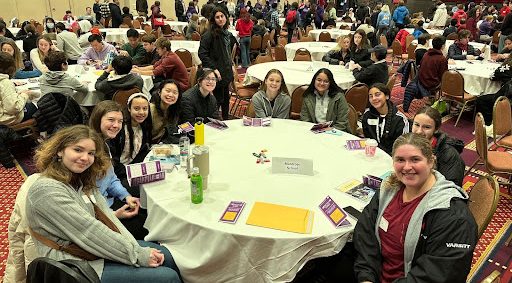Advice for Taking a Heavy Course Load
Copy Editor and high-achieving junior Catherine Olohan gives girls the low-down on how to manage a heavy work load.
When it’s time to choose your courses for the next school year, the advice people give tends to be variations of “don’t take too many APs,” “balance your course load!” “keep in mind the workload!” which is great advice that I highly recommend people consider. But nevertheless, there are always girls, such as myself, who make the decision to enroll in four or five AP classes. So what next? Once you’ve submitted that course form, where do you go from there?
I realized that I got very little advice on what to do once I did, in fact, find myself on this AP-riddled path, so here is a list of advice I’ve compiled for girls who have also found themselves facing a heavy course load for the next school year. Of course, this can apply to everyone, and each piece of advice should be taken with a grain of salt because you know yourself best. These are just the main things I have learned, which can hopefully provide you with some guidance.
1. Manage your time
This one may seem obvious, but it may actually be the most challenging. Determine how much time you need for each assignment, and then find the time to finish it. As tempting as procrastinating seems, try to avoid it as best you can. Personally, I set screen time reminders on my phone that remind me once I’ve been on an app too long. I also have a Chrome Extension called Mindful Browsing which gives a pop-up every time I open Pinterest or YouTube that reminds me that I would rather finish my homework. It’s not a perfect science, and I have spent many a late night working on things I could have finished by dinner time, but I’ve definitely gotten better at not procrastinating since September. If all else fails, just grab a snack, remember that future-you will be grateful, and buckle down to do the work.
2. Sleep is just as important as work
You might think you’re fine going to bed every night at midnight, but you’re not. Trust me on this. You need a good amount of sleep in order to function at your highest level in classes every day. The key to succeeding in an AP class is being thoughtful with your work, but the later you stay up, the more you do work for the sake of finishing it, and the less you retain. Call it quits at eleven, latest. Accept that every so often you won’t finish everything and will have to catch up later. This is one of the reasons why managing your time is so important. Catching up on work is not fun, so manage your time so that you don’t have to go to bed with unfinished work.
3. Doing half is better than doing none
This one builds off of the last two. If it’s late, and you realize you simply cannot finish everything on your plate, do at least some of it. Read a couple pages of your history book. Find a summary of the novel so you can keep up in class, but then read the chapters the next night. Only do the odds of your math homework. Obviously, finish the rest when you have time, but half is better than nothing going into class the next day.
4. Let yourself take a break
You can’t spend your week entirely absorbed in school work. You’ll get stressed, burnt out, and overwhelmed. So if a friend asks you to hang out on Friday night, go for it! Do your work on Saturday and Sunday (obviously you know your schedule the best, so this circles back to “manage your time” again.) Make time for your friends and family; you will be much happier for it.
5. Don’t cram. Start studying smarter and earlier
Cramming before a test is not an effective way to study, especially in an AP curriculum where many of the tests are more focused on analysis/critical thinking as opposed to content. You will not do your best work if you spend the entire night trying to learn as much information as you possibly can. Figure out study methods that work for you, and then do a little bit each night. Find a study method that helps you retain more information faster. Everyone is different, so if flashcards are your go-to, do it! If you want to handwrite everything on one big study guide (my personal favorite), go for it! Always start sooner than you think you need to. The same goes for papers. If you think you can start studying or writing on Wednesday, start on Monday.
So, there you have it. I’ll admit, I don’t always follow each piece of advice listed above, but I try my best. Late nights still happen, I still get stressed, and sometimes I feel like there’s way too much on my plate. But hopefully this advice will stick in the back of your mind, even if you don’t always put it into practice. All that’s left to say is good luck! Manage your time, find a system that works, and crush it!
Catherine Olohan ‘22, Copy Editor















